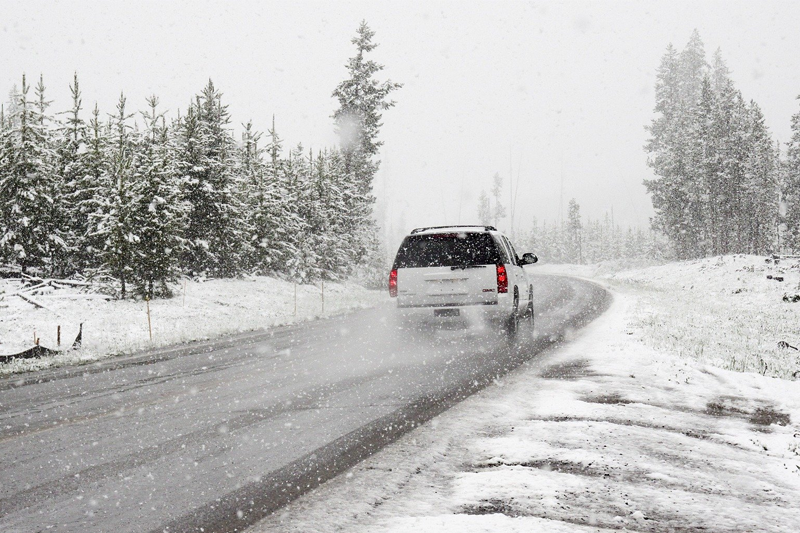IEM Insight: Holiday and Winter Travel Safety

Before departure, always reference local/state health department and CDC guidelines regarding COVID-19 restrictions and/or recommendations in the area you are traveling to. As of November 5, 2020, at least 33 states have some travel restriction in place.
As we head into the winter holiday season many individuals and families are trying to plan for how they can stay safe while traveling this holiday season. Many public health experts and state and local officials have recommended against the typical holiday gatherings for Thanksgiving and Christmas. If you do plan to travel, below are some recommendations you can follow.
When traveling to see family members outside of your household it is important that everyone social distance as much as possible for the two weeks before traveling and consider taking a COVID-19 test to ensure safety. Comparatively, driving is safer than flying. However, any sort of travel increases the risk of exposure to the virus so it is best to avoid traveling during this time if possible.
![]() Air Travel When flying, being in an airplane is currently not considered at high risk because of how the air is circulated and filtered on the plane; the primary risk is due to the challenge of maintaining social distance on crowded flights, and sitting 6 feet apart, sometimes for hours. Furthermore, the potential exposure at airports is high due to the large number of people from different parts of the country sharing an indoor space. It can be difficult to observe standard safety protocols while standing in line for boarding passes and at security check points, waiting for the flight to board, using the restrooms, and eating food. To minimize these risks print up your boarding pass before arriving at the airport and apply for the TSA PreCheck program to move through security faster and minimize your time waiting in line. Always remember to wear a facial mask and carry and use hand sanitizer with you when traveling. Wash your hands frequently and limit drinking/eating or other time without your mask on.
Air Travel When flying, being in an airplane is currently not considered at high risk because of how the air is circulated and filtered on the plane; the primary risk is due to the challenge of maintaining social distance on crowded flights, and sitting 6 feet apart, sometimes for hours. Furthermore, the potential exposure at airports is high due to the large number of people from different parts of the country sharing an indoor space. It can be difficult to observe standard safety protocols while standing in line for boarding passes and at security check points, waiting for the flight to board, using the restrooms, and eating food. To minimize these risks print up your boarding pass before arriving at the airport and apply for the TSA PreCheck program to move through security faster and minimize your time waiting in line. Always remember to wear a facial mask and carry and use hand sanitizer with you when traveling. Wash your hands frequently and limit drinking/eating or other time without your mask on.
![]() Road Trip While flying has its dangers, driving is not without risks. However, taking a road trips allow travelers a little more control over their safety, permitting them to take special precautions that help to minimize risk. Before traveling, make sure your car is in good driving condition to avoid any unexpected stops that would expose you to additional individuals. Plan your road trip ahead of time, of course you know what the destination is, but it is also important to be aware of different rest stops on your route and plan for any food breaks. Be aware of the local public health guidance in the cities or towns you are stopping in, especially traveling through multiple states. Plan for a minimum amount of food stops – pack food and water and enjoy them at a picnic spot. Below is IEM’s suggested COVID-19 Travel Kit which will help keep you and your loved ones safe while traveling this holiday season.
Road Trip While flying has its dangers, driving is not without risks. However, taking a road trips allow travelers a little more control over their safety, permitting them to take special precautions that help to minimize risk. Before traveling, make sure your car is in good driving condition to avoid any unexpected stops that would expose you to additional individuals. Plan your road trip ahead of time, of course you know what the destination is, but it is also important to be aware of different rest stops on your route and plan for any food breaks. Be aware of the local public health guidance in the cities or towns you are stopping in, especially traveling through multiple states. Plan for a minimum amount of food stops – pack food and water and enjoy them at a picnic spot. Below is IEM’s suggested COVID-19 Travel Kit which will help keep you and your loved ones safe while traveling this holiday season.
IEM’s COVID-19 travel kit:
- Masks or face shields for every person in the car (pack them in Ziplock bags with the names of all travelling together. Make sure that you have different bags with different dates so the masks can be changed daily on the trip).
- Hand sanitizer. Have a bottle in one of the cup holders. It would be better if every person in the car has their own hand sanitizer in a small clip on bottle that they can carry with them all the time.
- Disinfecting wipes and/or paper towels. Use the wipes before touching the gas pump, ATM machine, etc. if not wearing gloves. The wipes must be used to clean surfaces if stopping at a rest stop or a restaurant to eat. Moreover, wiping your cell phone if it is put on a table or any other surface outside the car.
- A box of disposable gloves. Make sure that you consider the glove size, so all are comfortable. If someone in the group has latex allergies use non-latex gloves.
![]() Restroom Precautions Avoid stopping at very crowded rest stops to use restrooms. If you must stop use basic precautions. Spend as little time in the restroom as possible. Avoid touching any surfaces in the restroom and don’t touch your face. Carry wipes or hand sanitizer to clean surfaces. Wash your hands and use a wipe or paper towel to open or close doors. Don’t forget to wear a face mask or covering and maintain a six-foot social distance from strangers in a rest stop or restroom.
Restroom Precautions Avoid stopping at very crowded rest stops to use restrooms. If you must stop use basic precautions. Spend as little time in the restroom as possible. Avoid touching any surfaces in the restroom and don’t touch your face. Carry wipes or hand sanitizer to clean surfaces. Wash your hands and use a wipe or paper towel to open or close doors. Don’t forget to wear a face mask or covering and maintain a six-foot social distance from strangers in a rest stop or restroom.
![]() Gas Stations When pumping gas take extra precautions. Pump handles and credit card keypads are high-touch surfaces that are not disinfected after each use. Use disposable gloves (nitrite or latex) when touching the key pad and pump handles and wear a mask when outside of your car. Do not touch your face, your phone or other surfaces with the gloves. Invert the gloves and dispose of them after use and sanitize your hands before getting back in the car. If you don’t have gloves, grip the pump handle with the paper towels found next to the pump to protect your hands. Consider keeping sanitary wipes in your car to wipe down pump handles and keypads before and after use. These practices will not only protect you but ensure that you are not inadvertently transferring the virus to the next person.
Gas Stations When pumping gas take extra precautions. Pump handles and credit card keypads are high-touch surfaces that are not disinfected after each use. Use disposable gloves (nitrite or latex) when touching the key pad and pump handles and wear a mask when outside of your car. Do not touch your face, your phone or other surfaces with the gloves. Invert the gloves and dispose of them after use and sanitize your hands before getting back in the car. If you don’t have gloves, grip the pump handle with the paper towels found next to the pump to protect your hands. Consider keeping sanitary wipes in your car to wipe down pump handles and keypads before and after use. These practices will not only protect you but ensure that you are not inadvertently transferring the virus to the next person.
![]() Staying at a Hotel or Rental House The first thing that potentially increases the risk of infection are interactions with strangers. This potential exposure can happen while waiting in line to check-in or interacting with hotel employees. Wear a mask to protect yourself any time you are outside of your room or car. Becoming infected from touching surfaces is always a risk. Inspect the room to see if it has been properly cleaned and disinfected by checking the bathrooms and seeing if the room is free of dust; check the heating vents to make sure they are clean and free of dust and dirt. These areas will be a major indicator of whether the hotel is clean and safe.
Staying at a Hotel or Rental House The first thing that potentially increases the risk of infection are interactions with strangers. This potential exposure can happen while waiting in line to check-in or interacting with hotel employees. Wear a mask to protect yourself any time you are outside of your room or car. Becoming infected from touching surfaces is always a risk. Inspect the room to see if it has been properly cleaned and disinfected by checking the bathrooms and seeing if the room is free of dust; check the heating vents to make sure they are clean and free of dust and dirt. These areas will be a major indicator of whether the hotel is clean and safe.
Staying overnight in a hotel is a low-risk activity for members of the same household. Most hotels are sanitizing and cleaning surfaces, but part of your responsibility is to carry hand sanitizing bottle and clean your hands after touching elevator buttons and door handles. Hand hygiene is the cornerstone of acquiring and spreading infection. Also, take extra precaution and wipe down surfaces and touch points in your hotel room. Consider skipping maid service for your stay to limit additional people from being in your room.
With house or other rentals, such as Airbnb or VRBO, they may be safer as there will typically be fewer contacts with other people. You also have more control over your environment at an Airbnb by doing spot cleaning yourself for high touch areas. Run utensils and dishware through the dishwasher; laundering bedsheets and towels; disinfect the flat surfaces — like kitchen countertops and; running a disinfecting wipe over phones, TV remotes, door handles, bathroom faucets, and toilet handles. Doing this will minimize your risk of infection.
For meals, room service or ordering delivery from a restaurant is the safest option. Eating indoors at the hotel restaurant or any restaurant is risky as when the food arrives you will have to remove your mask. However, if the weather is nice and there is outside seating at a restaurant where tables are 6 feet apart – enjoy with the necessary precautions!
Rashid A. Chotani, MD, MPH, IEM’s Chief Medical/Science Director
Dr. Rashid Chotani has spent over 20 years providing biodefense, infectious disease (with a focus on influenza, coronavirus, zika, Ebola, CCHF, dengue), and public health expertise to public agencies, private industry, academia, and non-profits. He is a recognized expert in medical countermeasure (MCM) development, biosecurity, healthcare management, health surveillance, and the diagnosis of human and zoonotic diseases.




